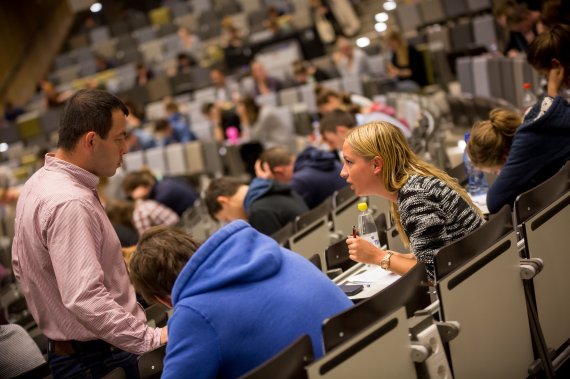© Sven Menschel
The tenure track system was introduced in 2009 as a way of attracting talented scientists from the Netherlands and abroad. All university lecturers are given a genuine chance to become a professor holding a personal chair as long as they satisfy strict requirements for teaching and research.
However the growing numbers of students has led to a sharp increase in the demand for teaching staff while the research capacity has not kept pace with this. Tenure track staff are therefore under considerable pressure from a big teaching workload. Moreover, not all lecturers want to become a personal professor.
Link
The proposal entitled Tenure Track 2.0 sets out various options for introducing more flexibility without dropping the link between research and teaching. The position of personal professor will no longer be the default end point; that will be the assistant professor. These assistant professors will also be allowed to supervise PhD candidates in future. They will still be able to progress to a personal professorship but the criteria for doing so will be imposed more strictly. The board expects a small proportion of associate professors to be promoted to personal professor.
A second important change is that the Executive Board wants to create a career path for talented lecturers who don’t want to do research. Exceptions will be made in which the employee is given a permanent contract with limited research commitments and can progress to a position on a par with that of the associate professor. The main job requirement for these lecturers is that they pay a lot of attention to innovative teaching methods.
Mentoring system
The proposal also covers some minor changes to reduce the workload for tenure track staff. For example, the board wants to introduce a mentoring system in which senior tenure track staff help younger colleagues. The criteria for winning new business will also be amended: tenure track staff will no longer be judged purely on how successful they are in actually securing research funding — they will also be assessed on how they tackle this task and collaborate with other chair groups. Tenure track scientists who help deal with peaks in teaching demand will be given longer to fulfil their research commitments. The tenure track will be extended anyway from 12 to 16 years.
Rector magnificus Arthur Mol says the plans meet the wishes of the chair groups to alleviate the teaching burden for tenure track employees and respond better to the fierce competition for research funding. Mol is also aware that some lecturers would rather focus on the teaching side. ‘But the combination of teaching and research will remain the norm.’
The board’s proposal is based on recommendations by a working group headed by the former director of the Educational Institute Tiny van Boekel. It has now been submitted to the WUR Council, the central representative body, for its consent.
More:
Career path besides tenure track
‘Tenure track agreements implemented incorrectly’
Up or out: the trials of the tenure track
Tenure track optional for established staff

